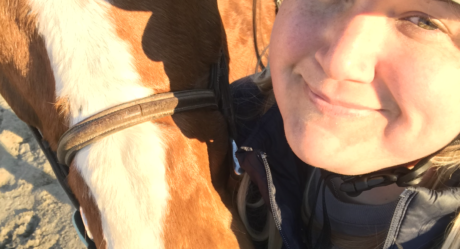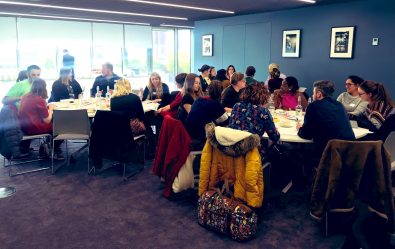
This year’s UKSFN conference took place at STEAMHouse in Birmingham on the 30th January. Over 60 people, both members and non-members of the network, joined in sessions across the day on topics including accessibility, AI, storytelling and the future of Festivals.
Conference rapporteur, Julie Ann Fooshee, summed up the day’s events in her closing statement. Here, she has re-produced a version of those comments.
The 2050 Science Festival Is Here Today

By Julie Ann Fooshee; PhD student University of Edinburgh reading in Science Communication and Public Engagement; pronouns she/her
On the morning of the 30th of January, 2024 we were tasked at the UK Science Festivals Network meeting with a big ask: what will festivals look like in the year 2050? This doesn’t come from just anywhere, the UK has a goal of net zero by 2050 and the UKSFN wants to know how science festivals can play a role in showing non-expert publics ways to reach this mark.
This call to action is not unlike the one made in the 1985 Bodmer Report which asked that scientists become better stewards of their work and that they share what they do with the public as a means to increase public trust in science. 2024 marks 39 years since that and we are still here, still working on just that. It may sound disheartening to think that we as festivals, communicators, engagers are four decades into this work and people still are wary of science, but what the UKSFN meeting has outlined is the rapid evolution of science in those four decades. The people we talk to in our festivals are grappling with both this fast-paced scientific advancement and the demands of their every-day lives and festivals provide a unique place for them to come to learn and find community.
Science festivals can be what is referred to as a third place. It’s somewhere that is neither work, nor home but the festival is more ephemeral in nature than your typical third place like a pub, café, or museum. Festival researcher Alessandro Falassi referred to them as a place that existed “time out of time” and as someone who researches festivals I think of this quote often.
As a society, we are running out of third places, which means that the festival has a critical future role. As a social hub, a cultural touchstone, they must serve within the community as not just a celebration of science but also a place that opens its doors for the community to come and find space and to be welcomed as they are. The strength of the future festival of 2025 all the way up to 2050 relies on decentralisation, and in building out strong partnerships with individuals, organisations, and stakeholders that share this vision of service to the community.
One of the quotes from the session on grass roots initiatives at the conference struck me: “when society is terrible, how can you accommodate around that?”
Festivals can’t wait for society to improve around them, they must be at the forefront of the change and moreover, as a social, cultural space, festivals have the opportunity to demonstrate best practice of the societal model. While there is bureaucracy in everything we do, festivals have a freedom of movement and of innovation that more brick-and-mortar organisations lack. Festivals have the ability to be nimble in their ideas and execution and to experiment with ideas and frameworks where other institutions may not be: let this be something that guides your practice when educating, communicating and collaborating with other outside entities and community organisations. Your festival has the means to bring their ecstatic and often times unrestrained visions to life.
There are so many places where people feel excluded, unwanted and that they aren’t “meant” to be there. Emily Dawson’s work in museums is as true now as it was when she published it and its applicable to festivals the same way it is to museums. However, through co-creative processes, festivals have the opportunity to expand beyond those boundaries, festivals can be and should be for everyone.
Unfortunately this is a deliberate process. Gone are the days of throwing community programming at the wall like pasta to see if it sticks and hoping that people attend. In 2024 we are dealing with a public that feels increasingly disenfranchised, has undergone a mass-disabling event, and that chooses daily between food and heating their home. To serve this public it’s about creating a place that they can escape to but that also meets their needs through conscious programming choices.
In that way perhaps it’s not so unfortunate at all. We are all working together, as a community to meet our needs, to meet others’ needs. I don’t think there’s anything more community driven, socially relevant, or culturally beautiful than that. So I leave you today with a question: what does your event do to address and honour the present? Otherwise you won’t get buy-in or pride of place; and second: what does your event do to supply people with opportunities for change?
2050 looks brighter every day, but start with tomorrow, start with next year. We can do it together.
Links and Citations:
Bodmer Report 1985: https://royalsociety.org/~/media/royal_society_content/policy/publications/1985/10700.pdf
Emily Dawson’s work: https://equityandeverydayscience.wordpress.com
Alessandro Falassi (this one you have to either have the physical book or get it from an academic library which is a bummer! But here is a citation for anyone looking): Falassi Alessandro. Time Out of Time : Essays on the Festival. 1st ed 1st ed. University of New Mexico Press 1987. 15 Feb. 2024.

